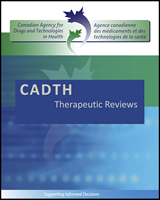Except where otherwise noted, this work is distributed under the terms of a Creative Commons Attribution-NonCommercial-NoDerivatives 4.0 International licence (CC BY-NC-ND), a copy of which is available at http://creativecommons.org/licenses/by-nc-nd/4.0/
NCBI Bookshelf. A service of the National Library of Medicine, National Institutes of Health.
Antithrombotic Therapy for Patients with Atrial Fibrillation — Project Protocol [Internet]. Ottawa (ON): Canadian Agency for Drugs and Technologies in Health; 2012 Aug. (CADTH Therapeutic Review, No. 1.1A.)

Antithrombotic Therapy for Patients with Atrial Fibrillation — Project Protocol [Internet].
Show details3.1. Literature Search Strategy
The literature search will be performed by an information specialist using a peer-reviewed search strategy. Published literature will be identified by searching the following bibliographic databases: MEDLINE (from 1946) with in-process records and daily updates through Ovid; Embase (from 1974) through Ovid; Cochrane Central Register of Controlled Trials through Ovid; and PubMed. The search strategy will consist of both controlled vocabulary, such as the National Library of Medicine’s MeSH (Medical Subject Headings), and keywords. The main search concepts will be dabigatran, apixaban, rivaroxaban, clopidogrel, acetylsalicylic acid, warfarin, acenocoumarol, and atrial fibrillation. Methodological filters will be applied to limit retrieval to randomized controlled trials and controlled clinical trials. Retrieval will be limited to English language articles and studies published after 1988. Conference abstracts will be excluded from search results.
Grey literature (literature that is not commercially published) will be identified by searching relevant sections of the Grey Matters checklist (http://www.cadth.ca/resources/grey-matters), which includes the websites of regulatory agencies, Canadian and major international health technology assessment agencies, and clinical practice guidelines, as well as The Cochrane Library (2012, Issue 6) and the University of York Centre for Reviews and Dissemination (CRD) databases. Google will be used to search for additional web-based materials.
3.2. Article Selection
Two reviewers will independently screen the titles and abstracts of all citations retrieved from the literature search and, based on the selection criteria, will order the full text of any articles that appear to meet those criteria. The reviewers will then independently review the full text of the selected articles, apply the selection criteria to them, and compare the independently chosen included and excluded studies. Disagreements will be resolved through discussion until consensus is reached.
Selection criteria are outlined in Table 1.
Table 1
Inclusion and Exclusion Criteria for Primary Studies.
3.3. Data Extraction and Critical Appraisal
Two reviewers will proceed with data extraction using a standardized template. Data that are to be extracted include the following:
- baseline characteristics of trial participants
- intervention(s) evaluated; including dose, duration, and relevant co-medication
- efficacy and safety results of the interventions for each of the pre-specified outcomes included in the protocol.
All extracted data will be checked for accuracy by two independent reviewers. Disagreements will be resolved through discussion until consensus is reached.
Findings will be interpreted in light of the heterogeneity of the individual studies (differences in design, study populations, interventions or exposures, and outcome measures) and the validity assessment. Further critical appraisal will be performed based on clinical input from experts.
3.4. Data Analysis Methods
Evidence tables describing the characteristics of the relevant studies will be developed. The results of clinical efficacy and harms will be described using a quantitative approach, as the clinical and economic assessments will be performed by indirect/mixed treatment comparisons, with the use of a network meta-analysis.
- METHODS - Antithrombotic Therapy for Patients with Atrial Fibrillation — Project...METHODS - Antithrombotic Therapy for Patients with Atrial Fibrillation — Project Protocol
Your browsing activity is empty.
Activity recording is turned off.
See more...